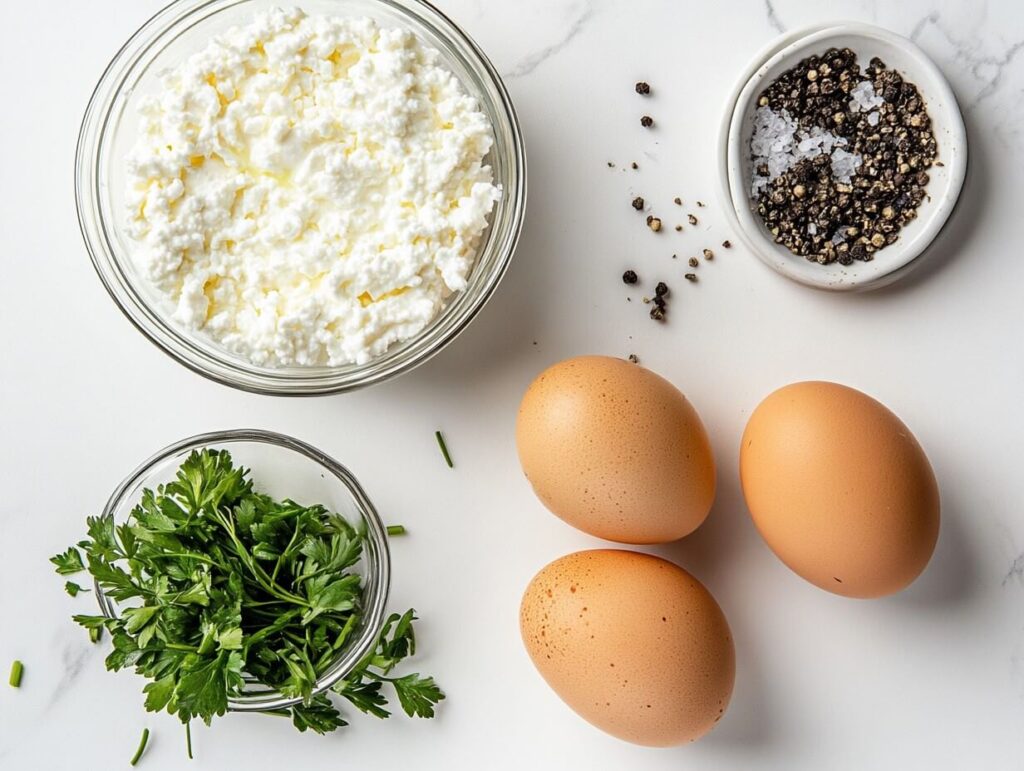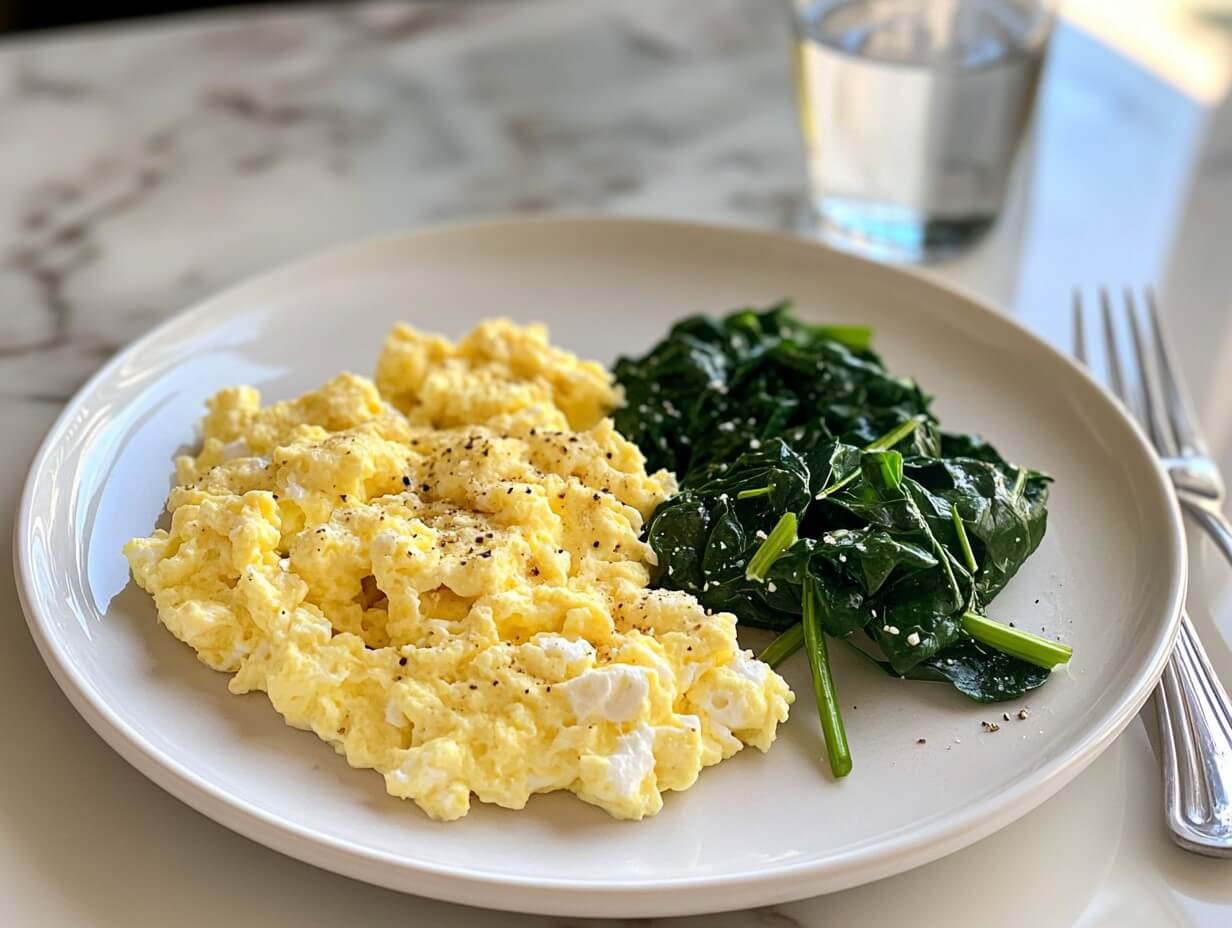Cottage cheese and eggs an unexpected duo? Think again! Together, these two wholesome ingredients create a protein-rich meal that’s quick, versatile, and delicious. Whether you need a nutritious breakfast, a post-workout boost, or a light lunch, this combination delivers.
So, what makes this pairing so popular, and why is it popping up in kitchens everywhere? Let’s dive into the details of this healthy, flavorful powerhouse!
What Are Cottage Cheese Eggs?
Simply put, this dish is a delightful blend where creamy, protein-rich cottage cheese meets a light, fluffy texture. You can scramble it, bake it into muffins, or whip it into a soft, airy omelet. The result? A hearty, high-protein meal that satisfies without feeling heavy.
Unlike standard breakfast scrambles, adding cottage cheese creates a smooth, creamy texture with a subtle tang that makes it unique. Plus, it’s endlessly customizable toss in your favorite veggies, spices, or even other cheeses to mix things up!
Why Cottage Cheese Eggs Are Trending
Why is this simple dish gaining so much attention? 🤔 Here are a few key reasons:
- High Protein, Low Calories: Both eggs and cottage cheese are protein-packed yet low in calories, making them a go-to choice for fitness enthusiasts and anyone focused on healthy eating.
- Quick to Prepare: This meal comes together in under 10 minutes, perfect for busy mornings or a late-night snack.
- Incredibly Versatile: Enjoy it scrambled, baked, or as part of a larger dish there’s no wrong way to serve it!
- Affordable and Accessible: Both ingredients are budget-friendly and easy to find, making this a practical addition to any meal plan.
Nutritional Benefits of Cottage Cheese Eggs
When it comes to nutrition, cottage cheese and eggs are a match made in foodie heaven. Together, they create a meal packed with essential vitamins, minerals, and macronutrients. Let’s break it down:
Protein-Packed Goodness for Muscle Health
Eggs are already a fantastic source of complete protein, but when paired with cottage cheese, the protein content soars! Protein is essential for:
- Building and repairing muscles after workouts.
- Promoting satiety and reducing unnecessary snacking.
- Supporting overall body growth and cellular repair.
For example: A single serving of scrambled eggs with ½ cup of cottage cheese can deliver over 20 grams of protein that’s like a mini protein shake without any artificial additives.
“Fuel your body with protein that works as hard as you do. Cottage cheese eggs keep you full, energized, and ready to conquer the day!”
Low-Calorie & High-Satiety Combination
While both cottage cheese and its protein-rich counterpart offer excellent nutrition, they’re surprisingly low in calories. This makes the combination a perfect choice for weight management.
A single large serving has just 70 calories while being packed with protein and healthy fats. Add ½ cup of low-fat cottage cheese (around 100 calories), and you’ve got a creamy, satisfying meal that stays under 200 calories.
If you’re watching your calorie intake but still craving something hearty, this pairing will keep you full and guilt-free.
Perfect for Weight Loss and Fitness Enthusiasts
Weight loss isn’t just about cutting calories it’s about eating foods that keep you satisfied. Cottage cheese eggs are perfect because:
- They’re low-carb and high-protein, making them ideal for keto or low-carb diets.
- The high protein content helps reduce hunger hormones, keeping you full for hours.
- Cottage cheese adds volume and creaminess without adding empty carbs.
For fitness enthusiasts, the combination of fast-digesting protein from eggs and slow-digesting protein from cottage cheese creates the ultimate post-workout recovery meal.
How to Make Cottage Cheese Eggs at Home
Now that you’re convinced cottage cheese eggs are a must-try, let’s get into the how-to. Here’s a simple recipe to make your mornings brighter and healthier.
Ingredients You Will Need

To whip up a basic batch of cottage cheese eggs, gather the following ingredients:
- 2 large eggs
- ½ cup cottage cheese (low-fat or full-fat)
- Salt and black pepper to taste
- ½ tsp butter or olive oil (for cooking)
- Optional add-ins: Chopped spinach, tomatoes, mushrooms, or your favorite herbs.
Step-by-Step Cooking Instructions
Follow these simple steps to create creamy, fluffy cottage cheese eggs:
- Crack the Eggs: In a bowl, whisk the eggs until fully combined and slightly frothy.
- Add Cottage Cheese: Stir in the cottage cheese. Don’t overmix you want small creamy chunks.
- Season It Up: Add a pinch of salt, black pepper, or any other preferred seasonings.
- Heat the Pan: Warm a non-stick skillet over medium heat and melt the butter (or use olive oil).
- Cook Gently: Pour the mixture into the skillet and let it sit for a few seconds. Stir gently using a spatula.
- Low and Slow: Cook over low heat, stirring occasionally, until the eggs are soft and just set.
- Serve Hot: Plate your cottage cheese eggs, sprinkle some herbs (like chives or parsley), and enjoy!
Common Cooking Mistakes to Avoid
Making cottage cheese eggs sounds easy, right? It is, but a few common mistakes can mess up the texture:
- Using High Heat: Eggs cook best over low heat. High heat will make them rubbery instead of creamy.
- Overmixing Cottage Cheese: Don’t fully dissolve the cottage cheese. The small chunks give the eggs their unique texture.
- Cooking Too Long: Take the eggs off the heat when they’re slightly underdone. Residual heat will finish cooking them.
Popular Variations
Cottage cheese eggs are wonderfully versatile. If you want to add variety to your meals, here are some popular ways to enjoy them:
Cottage Cheese Scrambled Eggs
This is the classic way to prepare this creamy cottage cheese dish. Simply whisk the cottage cheese with your base mixture, cook it gently, and voila! You get a fluffy, creamy scramble with a hint of tanginess. Add chopped herbs like dill or chives for an extra burst of flavor.
Cottage Cheese Omelet
Looking for something fancier? Beat eggs and cottage cheese together, pour the mixture into a skillet, and let it cook without stirring. Add fillings like spinach, mushrooms, or cheese for a hearty omelet.
Baked Cottage Cheese Eggs
Perfect for meal prep! Mix cottage cheese and eggs, pour into a baking dish, add vegetables or shredded cheese, and bake for 20–25 minutes. You’ll have a fluffy, protein-rich casserole ready to feed the family.
Cottage Cheese Egg Muffins
On the go? Cottage cheese egg muffins are your answer. Pour the egg mixture into muffin tins, add toppings like diced veggies or cheese, and bake for 15–18 minutes. These little bites are portable, nutritious, and delicious.

Health Benefits of Combining Eggs and Cottage Cheese
You’ve probably heard how healthy cottage cheese is on its own. But when paired with this other protein-packed ingredient, it becomes a true nutritional powerhouse. Whether you’re an athlete, a busy professional, or someone simply aiming to improve your diet, this combination offers benefits your body will thank you for.
Boosting Energy Levels Throughout the Day
Ever hit that mid-morning slump? It’s often the result of carb-heavy breakfasts that cause a quick blood sugar spike followed by an energy crash. The solution? A protein-rich breakfast!
Eggs deliver a steady release of energy through their protein and healthy fats, while cottage cheese provides slow-digesting casein protein. This combination keeps you fueled, focused, and full for hours.
Starting your day with this duo is like filling your body with premium fuel. You’ll feel sharp, satisfied, and ready to conquer whatever comes your way!
“A breakfast of cottage cheese eggs is the secret to sustained energy no more hunger pangs or sugar crashes before lunch!”
Supporting Bone Health with Calcium & Vitamin D
One of the standout nutrients in cottage cheese is calcium, vital for strong bones and teeth. Eggs, on the other hand, are an excellent source of Vitamin D, which helps your body absorb calcium effectively.
Together, they’re the ultimate bone-boosting duo! For individuals at risk of osteoporosis, or growing kids and teens, this combination can help meet daily nutrient requirements and keep bones strong and healthy.
Improving Digestion with High Protein Content
Protein isn’t just for muscles it’s also crucial for digestion. High-protein meals like cottage cheese eggs slow down digestion, keeping you full longer and stabilizing blood sugar levels.
Plus, the casein protein in cottage cheese promotes gut health by feeding the “good bacteria” in your digestive system. If you’ve been dealing with bloating or irregular digestion, this meal can be a game-changer.
Who Should Eat Cottage Cheese Eggs?
While cottage cheese eggs are great for almost anyone, they’re particularly beneficial for specific groups. If you fall into any of these categories, you’ll want to add this dish to your menu ASAP.
Ideal for Athletes and Gym-Goers
Athletes and fitness enthusiasts know the importance of protein for muscle recovery and growth. Combining creamy cottage cheese provides both fast-digesting protein and slow-digesting casein, making it the perfect post-workout meal.
Not only does this protein-packed combination supply essential amino acids, but it also aids in muscle repair after intense training. Plus, it’s light enough to avoid post-meal sluggishness while still being incredibly filling.
Beneficial for Those Managing Diabetes
If you’re managing diabetes, it can become your breakfast staple. Eggs have minimal carbs, so they don’t spike blood sugar, while cottage cheese adds protein and a creamy texture without empty calories.
The slow digestion of protein ensures stable blood sugar levels, helping you avoid sudden spikes or drops. Just be sure to pair it with low-carb vegetables for a balanced, diabetes-friendly meal.
Suitable for People on Low-Carb Diets
If you’re following keto, Atkins, or any other low-carb diet, this egg and cottage cheese combination is a perfect fit. Eggs are naturally low in carbs while providing healthy fats and protein, and full-fat cottage cheese adds a creamy texture without tipping your carb limit.
This meal works for breakfast, lunch, or dinner, keeping you well within your daily macros. Plus, it’s so satisfying and filling, you won’t even miss those carb-heavy alternatives.
Common Problems When Cooking Cottage Cheese Eggs
Let’s be honest while making cottage cheese eggs is pretty straightforward, things can go wrong if you’re not careful. Luckily, these common problems have simple solutions to ensure perfect results every time.
Texture Too Runny? How to Fix It
If your eggs end up watery, excess moisture from the cottage cheese is likely the cause. To fix this:
- Choose low-moisture cottage cheese or drain it before mixing it with the eggs.
- Cook on low heat to allow the eggs to set gradually and firm up properly.
- Stir sparingly to let the eggs cook naturally, ensuring a creamier texture.
Eggs Overcooked? Tips to Avoid It
Overcooked eggs can quickly become rubbery and lose their creamy appeal. Here’s how to prevent it:
- Always cook on low to medium heat. Eggs cook quickly, so there’s no need to rush.
- Remove the eggs from the skillet while they’re still slightly underdone. The residual heat will finish cooking them.
- Stir gently to avoid breaking up the texture no need for aggressive scrambling.
Unpleasant Taste? Choosing the Right Ingredients
Sometimes, cottage cheese eggs can have a slightly off taste if you’re not using high-quality ingredients. Here’s how to keep your dish flavorful and fresh:
- Use fresh eggs they make a world of difference in flavor.
- Opt for full-fat cottage cheese if you prefer a richer taste. Low-fat varieties can sometimes taste tangy or watery.
- Season generously! Adding salt, pepper, and herbs like chives or parsley can elevate the overall flavor.
“Good food starts with good ingredients. Use fresh eggs and quality cottage cheese for the best-tasting cottage cheese eggs!”
Best Seasonings and Add-ons
Cottage cheese eggs are delicious on their own, but why stop there? A few carefully chosen add-ons and seasonings can transform this simple dish into a gourmet meal.
Herbs and Spices to Enhance the Flavor
Herbs and spices are your best friends when it comes to boosting flavor without adding calories. Here are some top choices:
- Chives: Their mild onion flavor pairs beautifully with cottage cheese eggs.
- Dill: Adds a fresh, slightly tangy taste that works well with eggs.
- Paprika: A pinch of smoked or sweet paprika gives a subtle kick.
- Garlic Powder: Enhances savory notes without overpowering the dish.
Healthy Vegetables to Add for Extra Nutrition
Here are some great options:
- Spinach: Adds iron and fiber while blending seamlessly into the eggs.
- Mushrooms: Bring a rich, earthy flavor and a boost of vitamins.
- Tomatoes: Fresh tomatoes add juiciness and a pop of color.
- Bell Peppers: Their sweetness and crunch complement the creamy eggs perfectly.
Simply chop your chosen vegetables and sauté them for a minute or two before adding the egg mixture.
Cheeses That Pair Well
If you’re a cheese lover, don’t stop at cottage cheese add more! The right cheeses can add richness and complexity to your dish. Some favorites include:
- Cheddar: Sharp and flavorful, perfect for scrambled or baked eggs.
- Mozzarella: Adds a stretchy, melty texture that’s irresistible.
- Feta: Tangy and crumbly, feta works well in omelets or egg muffins.
- Parmesan: A sprinkle of parmesan adds a salty, umami kick.
FAQs
Does cottage cheese taste good with eggs?
Absolutely! Mixing cottage cheese with eggs creates a creamy, slightly tangy texture that complements the richness of the eggs perfectly. The mild flavor of the cheese balances the dish beautifully, making it both satisfying and protein-packed while remaining light and fluffy.Learn more about the benefits of cottage cheese in breakfast recipes.
Why are my eggs with cottage cheese so watery?
Explore tips on fixing watery cottage cheese eggs for perfect consistency every time.
To fix this issue:
- Drain the cottage cheese: Use a fine mesh strainer or paper towel to remove extra liquid before mixing it with eggs.
- Opt for full-fat cottage cheese: Low-fat or fat-free versions tend to have a higher water content.
- Cook slowly: Use low heat to prevent the eggs from cooking too quickly and releasing additional moisture.
How much cottage cheese should you use in scrambled eggs?
For a balanced texture and flavor, use about ¼ to ½ cup of cottage cheese per 2–3 large eggs. This amount ensures the eggs stay creamy without being overly rich or wet. If you’re trying this combo for the first time, start small and adjust the quantity based on your preference. It’s all about finding the right ratio to suit your taste! Discover fluffy cottage cheese scrambled eggs for a more advanced version of this dish.
What does Gordon Ramsay put in his scrambled eggs?
Gordon Ramsay’s signature scrambled eggs are known for their silky, luxurious texture. His method includes:
- Fresh eggs: The foundation of a perfect scramble.
- Butter: Adds richness and creaminess.
- Crème fraîche: Softens the eggs and gives them a smooth finish.
- Salt and pepper: Seasoning is added at the end to avoid altering the eggs’ texture.
While Gordon doesn’t typically add cottage cheese, you can use his technique (low and slow cooking) to achieve creamy version. For an extra protein boost, stir in a bit of cottage cheese during the cooking process it’s a twist worth trying!
Final Thoughts
Cottage cheese eggs might sound like an unexpected combination, but they’re truly a game-changer in the world of quick, nutritious meals. Whether you’re fueling up after a workout, prepping a healthy breakfast, or just craving something creamy and delicious, this dish ticks all the boxes.
The best part? They’re incredibly easy to make. In under 10 minutes, you can create a dish that’s satisfying, wholesome, and good for your body. It’s a small effort for big rewards better energy, stronger muscles, and fewer hunger pangs. Check out our ultimate guide to making egg-based breakfasts for more ideas.

